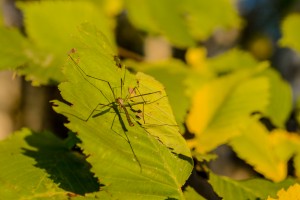Don’t Let the Mosquitoes Bite

West Nile virus, St. Louis encephalitis virus, dengue virus and others are transmitted to humans through the bites of infected mosquitoes.
With recent heavy rainfall in Texas and neighboring states, it appears we will likely see large populations of mosquitoes and probably a corresponding rise in reported cases of mosquito-borne diseases in the weeks ahead. The historic ‘peak’ for West Nile illness in West Texas is late June through early September.
“It’s allabout primary prevention,” said Ronald Warner, DVM, Ph.D., professor and epidemiologist in the Texas Tech University Health Sciences Center Department of Family and Community Medicine. “We have no vaccines for these diseases. You need to prevent mosquito bites in order to prevent infection. Take appropriate precautions.”
Warner said there was an epidemic of the West Nile virus across the U.S. from 2000 to 2006 that subsided somewhat.
“Now 10 years later, we are likely to see increasing activity,” Warner said. “West Texas areas are generally at higher risk for West Nile disease in humans and horses because the ecosystem on the High Plains favors the Culextarsalis mosquito, the most efficient vector of the virus. In fact, that mosquito is nicknamed ‘the Western encephalitis mosquito.’”
Warner said the West Nile, St. Louis encephalitis and eastern equine encephalitis viruses are transmitted through bites of infected mosquitoes. Songbirds serve as reservoirs of these viruses. Mosquito populations become infected from the birds and, in turn, transmit the viruses to humans and horses.
Only one out of 140 to 150 people infected with the West Nile virus will suffer severe effects of the disease, such as developing encephalitis or meningitis. Warner said 80 percent of people never know they have been infected and 20 percent may suffer only a mild case, known as West Nile fever. The most common symptoms of West Nile illness include fever, headache, muscle aches, joint pain, fatigue and a skin rash. Yet, unlike influenza, a person infected with West Nile virus does not experience a sore throat, upper respiratory problems, nor a runny nose or eyes.

Warner stressed that many people forget about West Nile and other mosquito-borne viruses until an outbreak is evident.
“Society sometimes becomes complacent about disease, and people stop taking precautions,” Warner said. “If you look at the historic perspective of human polio, for example, 65 years ago there were 25,000 to 35,000 cases of severe paralytic polio reported each year in the U.S. People were horrified to think they might get polio. Now, there is a routine childhood vaccine that prevents the disease, and many have forgotten about the days when polio would strike, injure and kill so many victims.”
Warner said the key is to remember there are proven steps to prevent mosquito-borne diseases. Taking simple precautions in your daily activities and home environment can limit your exposure and reduce mosquito bites. Most mosquito-borne diseases are acquired within 25 miles of the victim’s home.
West Texas residents should take these precautions to protect themselves from mosquito
bites:
- Drain standing water around the house frequently. Empty any buckets, flowerpot saucers, birdbaths, rain gutters, pet dishes and wading pools at least twice each week. Remove old tires and empty containers from your neighborhood.
- Dress in long sleeves and pants, especially during dawn and dusk when mosquitoes are most likely to be active.
- Use repellents that contain DEET, the active ingredient that best repels mosquitoes.
- Keep grass cut short, including your lawn, alleys and livestock pens.
- Make sure screens on doors and windows fit properly.
- Avoid using scented personal products, especially those with floral scents, which attract mosquitos.
“The male mosquito feeds on plant juices,” Warner said. “Therefore, mosquitos are attracted to certain scents. There is little or no science to back up whether or not mosquitoes are more attracted to persons who eat certain foods.”
Warner said West Texas might experience more human and animal cases of mosquito-borne disease this summer and autumn.
“The key is to not panic if you are bitten,” Warner said. “Not all mosquitoes are infected; possibly as few as 15 percent are. Be sure to consult your physician if you have any signs, symptoms or questions that concern you.”
Related Stories
Celebrating Veterans: TTUHSC’s General Martin Clay’s Legacy of Service and Leadership
From his initial enlistment in the Army National Guard 36 years ago to his leadership in military and civilian health care management roles, Major General Martin Clay’s career has been shaped by adaptability, mission focus and service to others.
Texas Tech University Health Sciences Center School of Nursing Named Best Accelerated Bachelor of Science in Nursing Program in Texas
The TTUHSC School of Nursing Accelerated Bachelor of Science in Nursing (BSN) program has been ranked the No. 1 accelerated nursing program in Texas by RegisteredNursing.org.
TTUHSC Names New Regional Dean for the School of Nursing
Louise Rice, DNP, RN, has been named regional dean of the TTUHSC School of Nursing on the Amarillo campus.
Recent Stories
The John Wayne Cancer Foundation Surgical Oncology Fellowship Program at Texas Tech University Health Sciences Center Announced
TTUHSC is collaborating with the John Wayne Cancer Foundation and has established the Big Cure Endowment, which supports the university’s efforts to reduce cancer incidence and increase survivability of people in rural and underserved areas.
TTUHSC Receives $1 Million Gift from Amarillo National Bank to Expand and Enhance Pediatric Care in the Panhandle
TTUHSC School of Medicine leaders accepted a $1 million philanthropic gift from Amarillo National Bank on Tuesday (Feb. 10), marking a transformational investment in pediatric care for the Texas Panhandle.
Texas Tech University Health Sciences Center Permian Basin Announces Pediatric Residency Program Gift
TTUHSC Permian Basin, along with the Permian Strategic Partnership and the Scharbauer Foundation, Feb. 5 announced a gift that will fund a new pediatric residency.
